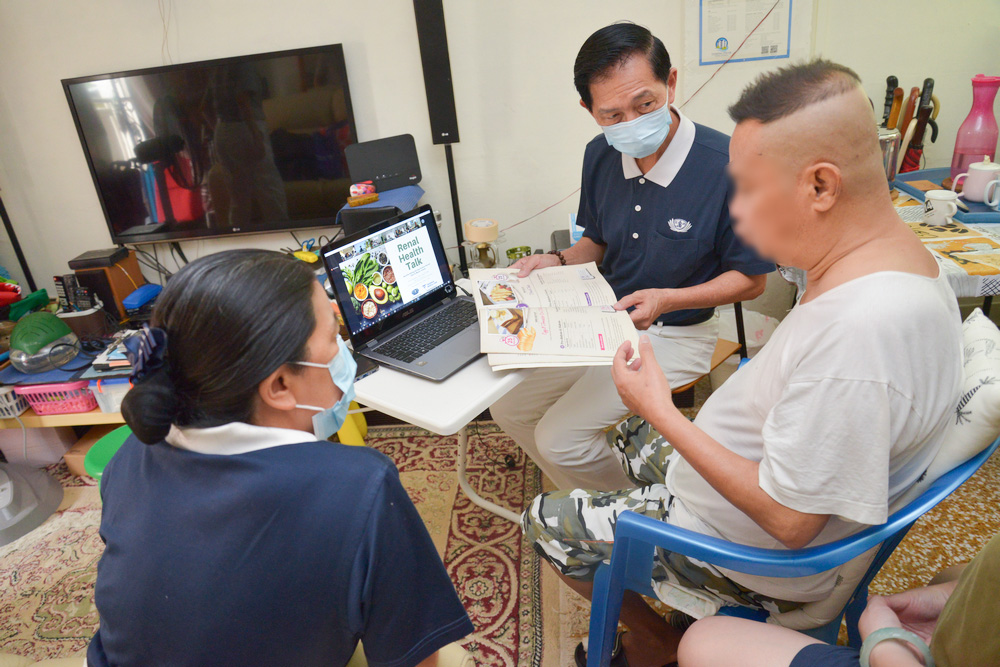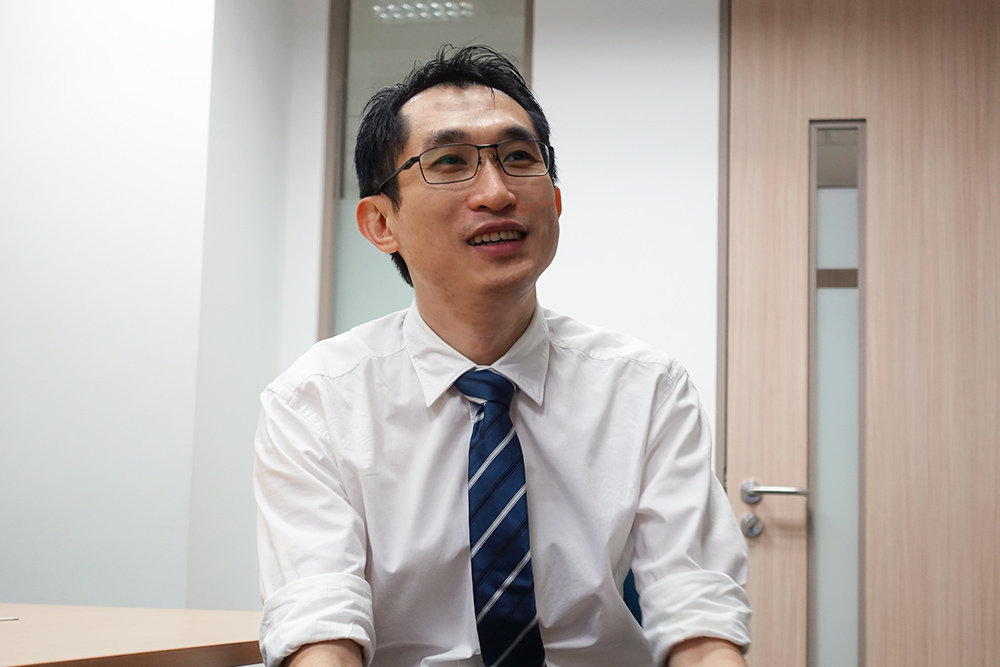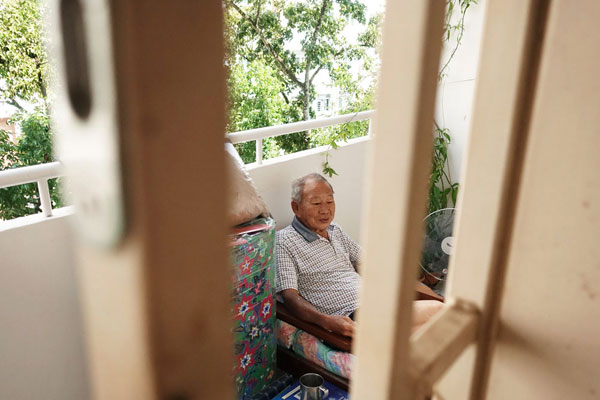
Dr Lewis Liew, urologist of the Lewis Liew Urology clinic in Gleneagles Medical Centre takes pain to record health conditions of a grandpa with poor eyesight as medical assistants help measure his blood pressure. (Photo by Khor Kim Seng)
Singapore is a highly urbanized society with a greying population and geriatric care has gradually become an important social issue. Though the majority of Singaporeans live in a decent environment, there is still the underprivileged who need assistance and support of the larger society.
Redhill, located in the centre of the Republic, is a district with high concentration of the needy. Most of the nearly 1000 households living in the single-room flats are elderly and low income earners. Many residents are lonesome and live in poverty with both their health and quality of life adversely affected.
Taking the initiative to offer support
On 19 Feb, the Singapore chapter of the Tzu Chi International Medical Association (TIMA) began adopting the ‘mobile clinic’ concept to offer home medical and home nursing services to elderly living in the six single-room flats in the vicinity of the Tzu Chi Free Clinic in Redhill Close.
The medical teams conduct blood tests, take blood pressure, as well as provide necessary medical treatments to the residents they visit. The first home visit saw 17 TIMA doctors, nurses, pharmacists, physiotherapists and NUS medical students attending to 18 elderly that day.
Since 2010, members of the Henderson Community Club and students of the NUS Medical Society have teamed up to provide regular medical checkups for the elderly living in Henderson in the hope that after learning about their health conditions, the elderly will go to the hospitals for proper treatments.
However, due to their unfavourable financial situation or difficulty in walking, many do not visit the hospitals and delay their much needed treatments. Such delay leads to a worsening of their health and makes the treatment they need to undergo more expensive.
After grasping a good understanding of the situation, Dr Edwin Lim of the Tzu Chi Free Health Screening and Medical Clinic decided to act on the situation and began contacting and liaising with the relevant authorities. Through the list of patients consolidated from inputs acquired from Henderson Community Club, Central CDC and Alexandra Hospital, he started to formulate a plan for the home medical and home nursing services of TIMA Singapore.
●●●
The first rays of sunlight were too weak to brighten the narrow and dark corridor, and the smell of damp air lingered on in the single-room flat.
“Uncle Toh, are you at home? We are here to do a medical check-up for you.” After a few calls, the 68-year-old resident finally woke up from his sleep to open the door for the TIMA members.
The floor in the living room was covered with newspaper. Disposable food boxes and used cups, bowls and chopsticks were scattered everywhere. A prosthesis and a few crutches were collecting dust in a corner, obviously unused for quite some time.
Uncle Toh has had his right leg below the knee amputated due to a car accident years ago. He has been living by himself in the small flat for the past seven to eight years and depended solely on his wheelchair when he goes out. While at home, he would just move around by crawling on the floor.
Through the home visit, the medical team wished to understand better his sickness and his way of living so as to give him appropriate treatment and assistance. With soothing words from the doctor and nurses, the withdrawn Uncle Toh started to warm up to the team and responded to their questions.
A preliminary examination revealed that his blood sugar and blood pressure were on the high side. “We will continue to provide him with care and assistance,” said Dr Lim. “We want patients like him to know that they are not alone and we’re going to keep encouraging them to give never up on themselves.”
In fact, besides caring about the health of the patients, the medical teams also pay much attention to other details such as how much the patients know about the right way to take medicine. Some of the elderly are totally ignorant about the proper way and some of them do not take their medicine as instructed by the doctor. Such long term negligence can lead to dire consequences for their health and even lives.
From the medical box of Grandma Lee who is in her eighties, the medical team found a packet of ready-made medicine from China. The granny explained that she had a persistent cough that would not heal, so she heeded her friend’s advice to take the medicine without consulting a doctor. The medical personnel immediately told her the side effects and risks of taking such medicine, to which she promised not to do so again without consulting the doctors.
Among the medical team that day were several medical students from the National University of Singapore. Participating in a Tzu Chi activity for the first time, Rana Aroos from Sri Lanka felt sorry for the underprivileged after having witnessed for herself their impoverished and tough living conditions. The fourth year medical undergraduate was deeply touched by the meticulousness and selflessness of the TIMA members in providing medical treatment to the patients.
“I am greatly inspired by the doctors who, despite their busy work schedule, extend their care and concern to the needy. I have learnt that genuine happiness comes from making selfless contributions. This is something that even a lofty salary can’t bring about.” TIMA’s medical humanitarianism has prompted Rana to think twice whether she should still look forward to pursuing material enjoyment after graduating from the university.
Rana also mentioned her wish to stay in Singapore after graduation to serve the local community and that participation in this home visit has helped her in setting her ambition. It also helps her in understanding deeper the four races of Singapore. To overcome the language barrier, she hopes to learn Malay and Chinese in future in order to communicate better with her patients of different races.
TIMA member Derek Tan, who is a nurse clinician at Tan Tock Seng Hospital, feels that there is a growing gap between the rich and poor in Singapore and there is a dire need for medical care for the poor. He boldly shouldered the responsibility to be the overall coordinator of the house calls and had even inspired his colleagues to join him. Derek is grateful that he has the opportunity to know about Tzu Chi, and he hopes to do his part in extending the house call services to other parts of Singapore.
A caring medical team is the foundation that protects human lives. TIMA Singapore will continue to reach out to where assistance is needed, offering their care and concern to the underprivileged. Through the house call services conducted in the morning of every first and third Sundays, the medical volunteers of Tzu Chi will continue to provide patients with necessary treatment and medicine till they recover from their sickness.

Before setting off for the home visit, the medical team takes stock of the medical equipment and medicine. (Photo by Pua Phoo Toong)

Adopting the mobile clinic concept, TIMA Singapore is set to bring services and patient-based care to the patients’ doorstep. (Photo by Pua Phoo Toong)

A car accident leaves 68-year-old Uncle Toh an amputee; a preliminary examination by Dr Edwin Lim (left) and clinician Derek Tan (right) reveals that his blood sugar and blood pressure are on the high side, and follow-up medical care will be needed. Soothing words from the two help the withdrawn senior to warm up to them. (Photo by Pua Phoo Toong)

Medical assistants and volunteers offering comforting words while conducting blood test for a resident. (Photo by Ng Paik Eng)

Grandma Lee has a persistent cough and she takes ready-made medicine from China without consulting the doctor. Upon learning the side effects and risks of doing so from the medical personnel, she promises not to take the medicine again. (Photo by Ng Paik Eng)

NUS medical student Rana Aroos (left) is deeply touched by TIMA’s medical humanitarianism after having witnessed the meticulousness of the medical team in offering medical care to the patients. (Photo by Pua Phoo Toong)



